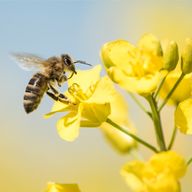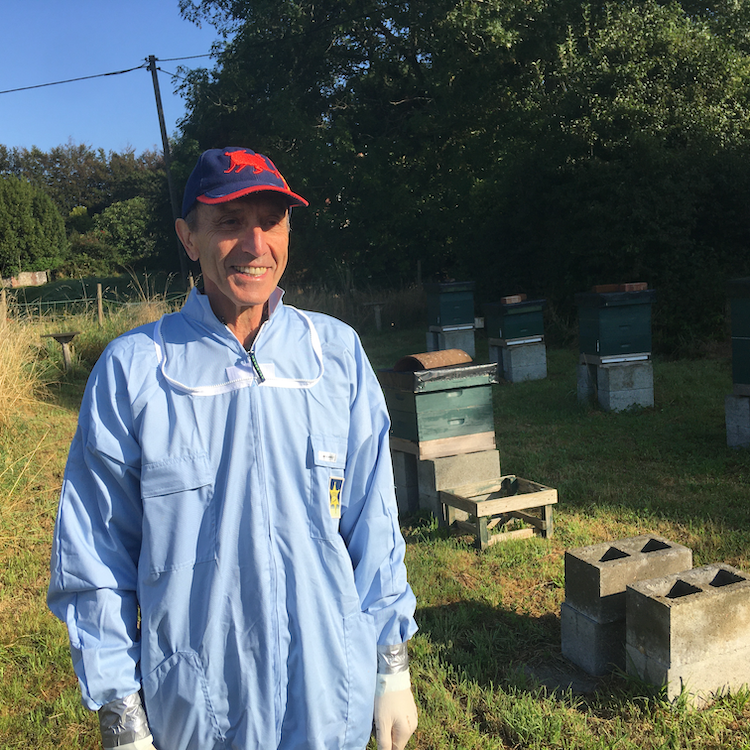
Luciano is a Research Technician at the Laboratory of Apiculture and Social Insects (LASI) and is responsible for managing LASI’s beehives and supporting research within the Sussex Plan for Honey Bee Health and Well Being.
The Sussex Plan is focused on practical questions that address the challenges currently facing honey bees such as parasites, diseases and lack of forage, which are so important for beekeepers and those trying to help bees, both in the UK and worldwide.
LASI is one of Rowse’s three Hives for Lives partners – a programme of vital initiatives which aim to protect bees and enrich livelihoods at the same time.
Why and how did you get into beekeeping?
I was brought up on a small farm in the northeast of Italy. It was a mixed farm, run on traditional lines for home consumption and the surplus produce was sold to private customers, shops or co-operatives. Wheat and maize were grown on the arable land to provide flour for bread and sweetcorn for polenta, a typical dish of that region. The maize was also fed to the great variety of free running poultry, pigs and rabbits, turkeys and ducks. There was an olive grove where the soil was rocky and unsuitable for ploughing. In the vineyards, fruit trees of all kinds were planted as support posts for the wires to which the vines were attached. The few acres of meadows supplied sufficient hay and fresh grass for the cows. And there, in one corner of the field, have always resided a few colonies of honey bees.
The great variety of flowers blooming from early spring until late September provided plentiful supplies of nectar for them. My eldest brother was responsible for looking after the bees, but I took part as well, especially at honey extraction time. The love of beekeeping has remained with me ever since.
One of the first things that my wife and I did when we moved into our new home in 1986 was to introduce hives in the garden. By the year 2005, we were running 70 colonies of bees in various apiaries in Sussex, while still continuing with our full-time jobs.
What do you do on a day-to-day basis?
My job as a beekeeper is very much determined by the time of the year – as far as the bees are concerned – and the students’ requirements.
Starting in the autumn, I ensure that the colonies are healthy, sufficiently supplied with stores of honey, strong in bees and with a young and vigorous queen to enable them to survive the winter. During the winter, apart from the treatment against the varroa mite in December, the hives are left well alone, and my time is spent on general apiary equipment repairs and maintenance.
Spring and summer are the busiest times of the year, as students need colonies of bees to carry out their various projects. Hives need to be prepared and moved to various locations according to the students’ needs and specialised equipment may need to be made for the experiments. The usual swarming period can be challenging, as I need to keep the colonies intact. This type of beekeeping involves a variety of activities with many unpredictable results, but this makes my work even more fascinating and enjoyable.
How does your work support the Sussex Plan research?
One of the most important aspects of the Sussex Plan research, as devised by Professor Francis Ratnieks, is aimed at helping the honey bees and beekeepers.
To achieve this, LASI have planned many projects studying the bees’ pests, diseases, and foraging behaviour. So, researchers and students rely on having honey bee colonies at their disposal for most of the year. My task is to ensure they have healthy and reliable colonies, suitable for their experiments, and prepared accordingly.
What are some of the challenges of managing LASI’s hives?
The weather has a big impact on colony development. The bees cannot fly on cold, windy, or rainy days and queens may not be able to mate successfully in poor conditions, as this takes place outside the hives.
The brood disease ‘European Foul Brood’ is a most infectious disease which can destroy many colonies and can jeopardize the running of experiments. There is also the Varroa mite which causes high mortality of colonies through its efficient transmission of the fatal Deformed Wing virus. These two diseases are no longer such serious difficulties as they once were, thanks to the research carried out at LASI and other centres. LASI have developed methods of producing honey bees which are resistant to these diseases and are of real value to bees and beekeepers alike.
What are some of the most important learnings you’ve taken from your time working with LASI?
I am now acutely aware of the vital role research carried out at LASI has played in overcoming some of the important challenges facing the honey bee.
This position has enabled me and countless other beekeepers to deepen our knowledge on beekeeping and how best to protect our bees against pests and diseases.
What advice would you give to someone else who wants to help save the bees or to keep bees?
Do not rush out to buy colonies of bees without first having learnt as much as possible about keeping bees. Join the local beekeeping association for guidance and mentoring.
What is particularly helpful to all kinds of bees is to provide them with bee friendly plants and trees to supply nectar rich forage from spring to autumn. Scientific research on honey bees has enabled huge advances in the understanding of honey bee behaviour, their pests and their diseases. One great way of helping to save the bees would be to support this endeavour.

